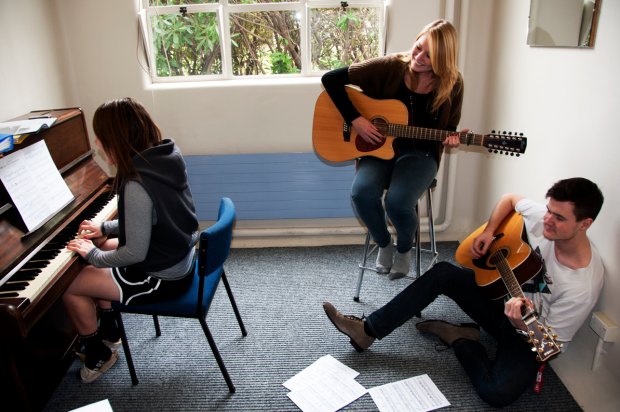 Image via otago.ac.nz
Image via otago.ac.nz
This article originally appeared on Soundfly.
For a brief few years in college, I got to treat music as a full-time job, devoting 40+ hours a week to musical improvement. I lived 10 minutes from the practice rooms and had very few responsibilities, so I could practice as much as sleep and school would allow. Now that I'm a full-fledged grown-up with a real job, that reality has faded. It takes work to turn your living room into the perfect practice space, and fighting the distractions of the real world can take serious work, but I've learned to find time to continue honing my craft. Here are a few tips that can help you do the same.
1. Put it in the calendar
Scheduling practice time can help you mentally reframe it as something you need to do rather than something you don't have time for. If your date book's super full, you may not be able to do this often, but try to make it happen on occasion. Once you've put it in your planner, allow yourself to look forward to it. Knowing you and your instrument are going to do some bonding can create a wonderful feeling of eager anticipation that will help you get the most out of what little time you have available.
2. Enhance your daily commute
There are some amazing apps out there designed to help musicians with skills like theory and ear training. If you're a rider (not a driver), these can help you spend your travel time productively. Also, finding music-related podcasts or new albums can be a great way to make your drive-time soundtrack a little more relevant to your musical life. Got any favorites? Share them in the comments!
3. Let music fill your daily life
Do vocal exercises while you wash the dishes. Practice quietly tapping rhythms while walking to your destinations. If the people in your life are the reason your schedule's so full, see if there's a way you can share music with them. Learn to play a simple duet with your child, pick a concert as your next date night destination, or trade playlists with your co-workers.
4. Eliminate less productive downtime activities
On Monday nights, I'm not allowed to watch TV. It seems like a silly, arbitrary rule to set for myself, but it's amazing how what would have been half an hour of brain-numbing entertainment turns into a truly productive bit of practice time.
5. Reset your wake-up time
I had a teacher who used to wake up at 6:00 a.m. to start practicing. By the time I got to my lesson at noon, she had already put in more "shed time" in a single morning than most people do in a week. Now, starting your practice six hours before showering is rather extreme, but setting your alarm 20 minutes earlier can lead to some serious musical improvement. Plus, I love starting my day with warm-ups and knowing I'm ready to play or sing from the get-go.
If you managed to find the time to read these suggestions, you'll be able to try some of them out. Good luck!
Get more practice tips:
- 8 Easy Tweaks to Make Your Practice Time Way More Productive
- How to Create a Productive Practice Space
- 4 Practice Routine Tips to Progress Faster on Your Instrument
- 3 Tiny Tweaks That Will Make You a Much Better Performer
Mahea Lee is a classically trained pianist and composer who has a degree from a jazz school and leads an electro-pop band. Her greatest musical passion is lyrical songwriting, but she's been known to write the occasional fugue. She graduated from Berklee College of Music, where she majored in contemporary writing and production and minored in music theory. For more Mahea, check out Soundfly's course, The Improviser's Toolkit.


